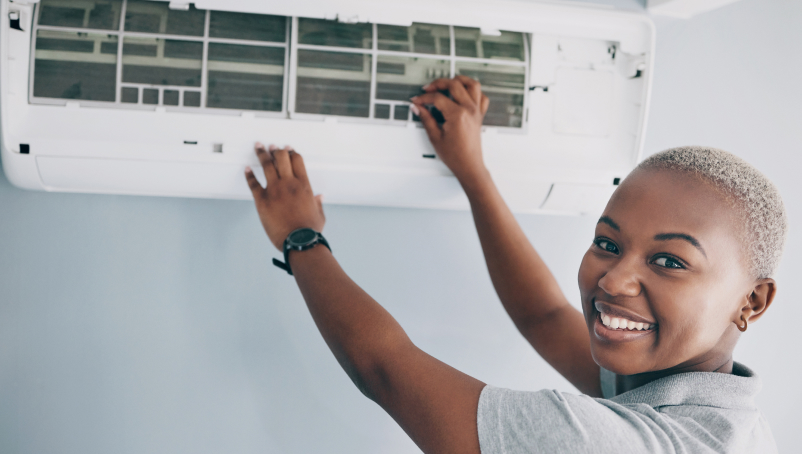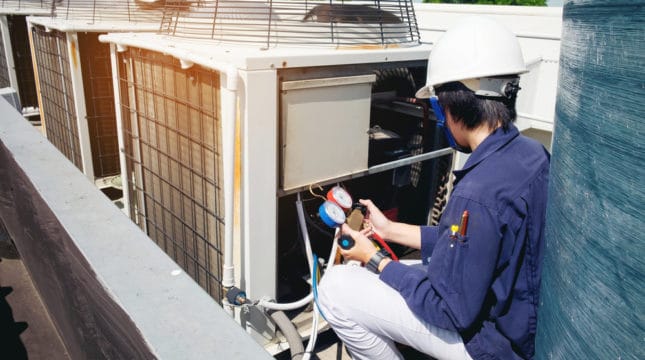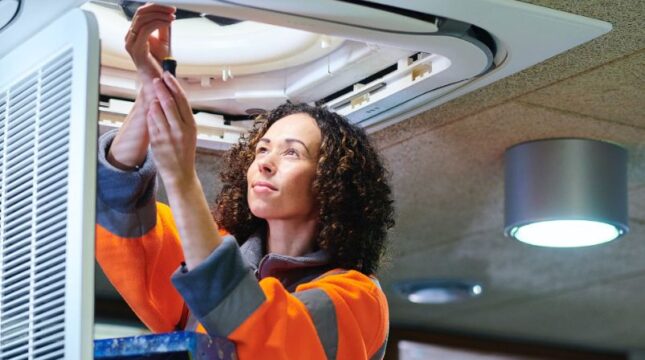Do you need a Louisiana HVAC license to do HVAC work?
Yes. You need a license in Louisiana to work as an HVAC contractor, but:
- Only on commercial projects worth more than $10,000 in labor and materials
- Only on residential construction projects worth more than $50,000
The Louisiana State Licensing Board for Contractors (LSLBC) oversees the licensure, and they award mechanical licenses with a heat, air conditioning, ventilation, ductwork and refrigeration subclassification.
EPA 608 Certification
Louisiana HVAC technicians must obtain the EPA 608 Certification to work with refrigerants. This certification, issued by the Environmental Protection Agency, ensures technicians understand refrigerants’ proper handling and disposal.
There are different levels of certification, including Type I (for small appliances), Type II (for high-pressure systems), and Type III (for low-pressure systems). To get certified, you must pass an exam covering federal regulations, refrigerant types and safety procedures. If you want to work with refrigerants, this is one of the most common HVAC certifications to obtain.
Insurance requirements for a Louisiana HVAC license
Residential contractors must show proof of business insurance in Louisiana to get their license. While HVAC commercial contractors are not required to present proof of insurance, certain types of HVAC insurance can help protect your business from common risks.
Workers’ Compensation insurance
All Louisiana HVAC business owners must have workers’ compensation insurance. If you or one of your HVAC technicians gets hurt on the job, this insurance can help provide wage protection and pay for medical expenses and other benefits.
If you are applying for a residential contractor license, you are required to carry workers’ compensation to get your license.
Learn more about workers’ compensation for contractors.
General Liability insurance
General liability insurance can help provide coverage if someone other than an employee claims that your company’s actions caused them injury or property damage.
Residential license applicants are required to hold a minimum of $100,000 in general liability coverage to get and stay licensed.
Learn more about general liability insurance for contractors.
Commercial Property insurance
Whether you own or rent your workspace, commercial property insurance is vital coverage for your business property. It also covers equipment, inventory and furniture related to your HVAC business.
Business Owner’s Policy
A business owner’s policy, or BOP insurance, provides broad coverage of general liability and commercial property policies combined in a single, cost-efficient bundle. It can help cover damage that you or your employees may accidentally cause to another person’s property and help protect your business equipment in the event of a fire or other covered event.
Tools and Equipment insurance
Tools and equipment insurance can help provide repair and replacement coverage for damaged or stolen work gear.
Commercial Auto insurance
Commercial auto insurance can help cover costs related to auto accidents, such as property damage and medical expenses.
In Louisiana, drivers must have liability insurance that meets the minimum limits required by law:
- $15,000 for bodily injury
- $30,000 for bodily injury per accident,
- $25,000 coverage for property damage
How to get an HVAC license in Louisiana
To get an HVAC license in Louisiana, follow these detailed steps:
1. Meet eligibility requirements
First, you must meet the eligibility requirements. This includes:
- Be at least 18 years old
- Have a high school diploma or GED
While a formal education is not mandatory, completing an accredited HVAC training program is highly beneficial and helps you pass the trade exam. Going to a trade school or community college can help cover the fundamentals of HVAC systems, mechanical systems, refrigerants, electrical components and local codes.
You can also opt to enter an apprenticeship, which often lasts 3–5 years. This allows you to gain on-the-job experience under the supervision of a licensed contractor while learning practical skills.
2. Submit your application
You can submit your completed application to the LSLBC. Along with your application, you must provide supporting documents.
Louisiana HVAC license requirements include:
- Registration status and charter number (If applying as a corporation, LLC or limited partnership)
- Financial statement
- Articles of incorporation/organization/partnership agreement (All but sole proprietor)
- Certificates of insurance (Not required for commercial license applicants)
Follow all instructions on the checklist page and ensure that all documents are up-to-date to avoid delays in the review process. For a single contractor classification, you’ll pay $160, which includes a background check processing fee. The application fees will vary if you apply for more than one classification or are an out-of-state applicant.
3. Pass the contractor exam and complete the online course
After applying, the LSLBC will send you a login and password to access the Board’s contractor portal. If you are the “designated qualifying party,” you’ll receive approval to sit for the trade exam and complete the Business and Law course online.
The licensing exam is in-person and closed-book, with 100 multiple-choice questions. You’ll have four hours to complete this examination. You can take the Business and Law course online. This is an educational course and doesn’t require preparation.
Each exam and course costs $120 or $240 in total. You’ll be eligible to receive your HVAC license once you pass the exam and take the course.
Louisiana HVAC contractor license reciprocity
The state of Louisiana offers reciprocity agreements with other states. However, reciprocity only applies to the exemption of taking the trade exam; it doesn’t waive any other requirements. Generally, reciprocity is only granted if the contractor has not been sanctioned or faced disciplinary actions from the reciprocal board for the past three years.
Louisiana has HVACR reciprocity agreements with Alabama, Mississippi, Nevada, Ohio, South Carolina, Tennessee and Utah.
To apply, submit the reciprocity application form.
HVAC contractor license renewal requirements
After the initial year of holding a Louisiana HVAC license, you can choose to renew for a one-, two- or three-year period on the online renewal form. The LSLBC will send a renewal notice 60 days before your license expiration date and 15 days prior. These notices will include instructions on how to renew online.
Only residential contractors are required to complete continuing education requirements. They must complete six hours annually by a board-approved provider.





